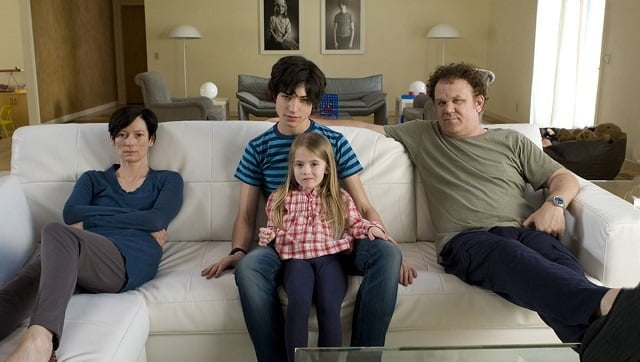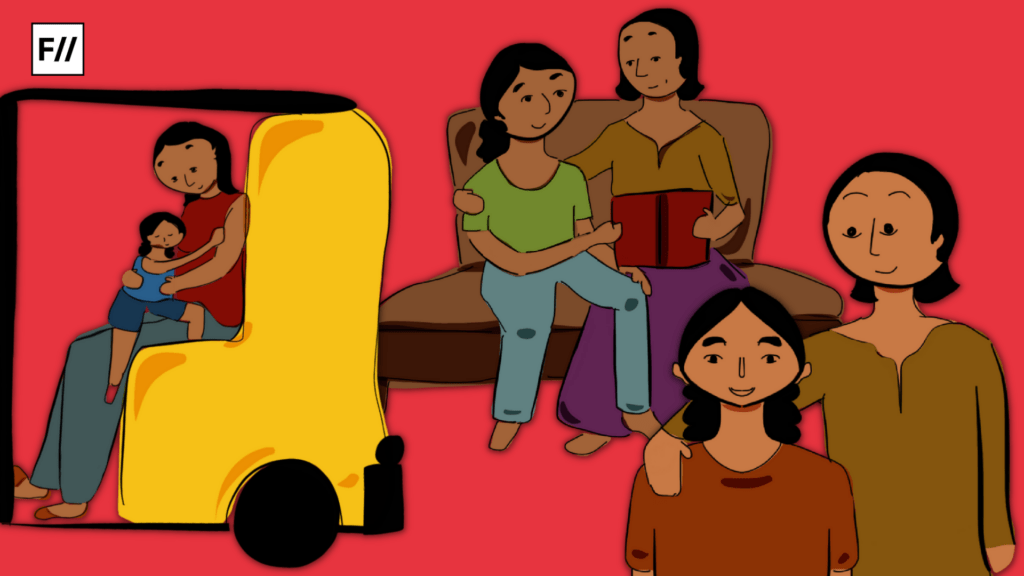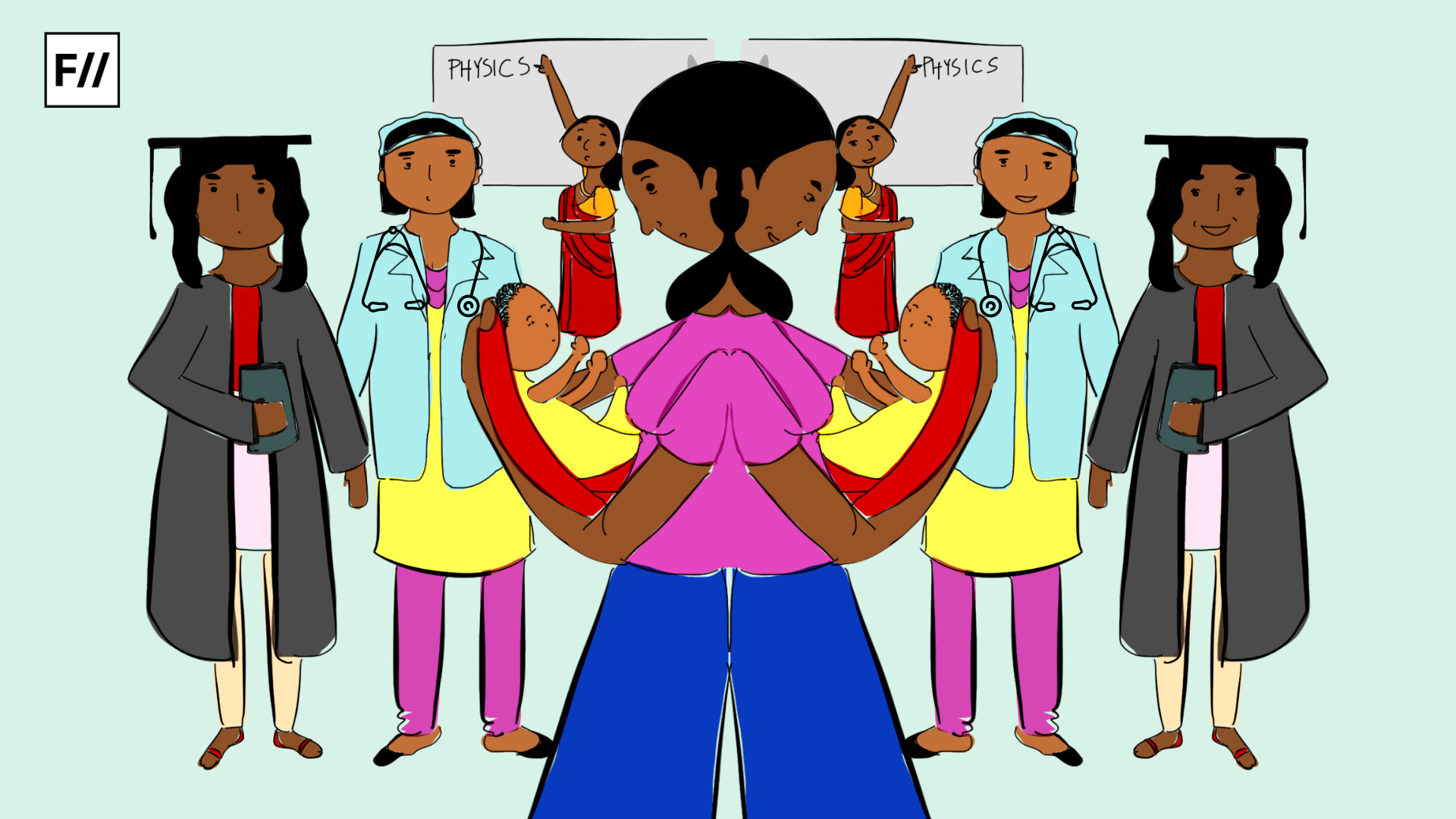There was once a “bad mother” in our neighborhood who left her child in her late 20s to discover herself. The father had to then take care of the child and bring her up. Since childhood, I was cited her example as a definition of a “bad mother”, a self-centered woman who left her only son for selfish interests.
In most households, the father is a passive participant in bringing up a child. The mother automatically becomes the one who bears all the responsibility, giving up her dreams, life goals, and in majority cases their jobs, which results in unhappy motherhood. This is a hardly discussed and uncomfortable topic.
Motherhood always comes in black and white, good and bad in mainstream discussion. Movies like “Mimi” show motherhood as a divine feminine responsibility and an all-fulfilling achievement. Truth be told, our society has for long garnered that divine idea of motherhood, to an extent where it is internalized and transformed into a compulsion and not a choice. Even if we do not delve into the entire patriarchal perception of women as reproductive machines, there is a lot to consider in the multiple facets of motherhood and its psychological impacts. Any behavior other than the established notion of women as the giver and nurturer is frowned upon. The woman then becomes a deviant and an evil mother figure.

Motherhood is a transitioning phase in the life of a woman, be it voluntary or otherwise. This transition does not necessarily be a positive one. It is more layered than one can perceive on the surface. In most households, the father is a passive participant in bringing up a child. The mother automatically becomes the one who bears all the responsibility, giving up her dreams, life goals, and in majority cases their jobs which results in unhappy motherhood. This is a hardly discussed and uncomfortable topic. In this scenario, it is not always a fulfilling experience, it may result in resentment and long-term depression.
A successful exploration of this implication of motherhood is done in “We Need to Talk About Kevin.” “Mommy was happy before Kevin came along. Now she wakes up every morning and wishes she was in France!” the scene in which she yells at young Kevin out of frustration from his disobedience is a poignant depiction of Eva’s recurrent yet failed attempt to become an ideal mother. The story is based on Eva, a travel writer, whose accidental pregnancy changes her life, taking away her passion and dreams. She succumbs to the requirements of motherhood giving up her job, and moving to the suburbs in a house she never liked. Much like in real life, Eva’s husband continues with his job and stays a passive parent figure in Kevin’s life. He enjoys Kevin’s company without dealing with his constant fuss and very conveniently gains his affection. Eva’s whole period of pregnancy, childbirth, and becoming a mother to a psychopathic child is uncomfortable and grim for the viewers to watch on the other hand.
Though resentful in the beginning, her effort of becoming a mother and fitting herself into the construct of motherhood is visible. She even gets pregnant with a daughter, and we, the audience, cannot help but interpret the pregnancy to be intentional. When Kevin starts showing psychopathic tendencies, without, in fact, talking about Kevin, he blames Eva as does society when Kevin goes on a murder spree at his school. Eva’s whole life turns into a series of flashbacks, humiliation, and guilt in the aftermath of the harrowing event.

Blaming the mother is a universal tendency. Even the children sometimes feel entitled to resent their mother if they refuse to give up their careers in order to pursue motherhood solely. This causes a strained relationship between the mother and the child. Rituparna Ghosh’s “Unishe April” navigates this very dynamic of a mother-daughter relationship skillfully. The ones who diligently follow the prescribed role of a mother often find themselves in a difficult position once the child is not a child anymore, moving on with their lives in a different city say for instance. The void that is created due to the sudden lack of responsibility in their lives can cause depression in women. The identity of a mother is at stake because being a mother often becomes her sole identity. They are used to recognizing themselves as someone’s mother while their original identity takes a back seat. They start lacking a sense of purpose and belonging as now she is bereft of the only identity she was accustomed to. She then questions her life choices, often resulting in a violent reaction towards other family members, and also their children.
Motherhood being such a complex role requires a lot of attention in terms of the mother’s mental health. Contemporary motherhood has proven to be especially difficult. Our culture expects women to be all-rounders. On mothers’ day or women’s day, we see several social media posts portraying women as the master of all. Society burdens women with unrealistic expectations, be it in terms of motherhood or work. As millions of mothers hustle and sacrifice their happiness and pleasures to balance their lives, these conflicting expectations take a psychological toll. Too many women are victims of these societal expectations. They are worn out, fatigued, and guilty because they are unable to manage time for their husbands and children as they are supposed to do.

Because no matter how much mental health awareness is spread through the internet, it is still a taboo. Especially the older generation has not yet completely adapted to the idea of their mental health being publicly discussed, and to see a doctor seems a far-fetched affair. The woman’s health in a conventional familial structure is often neglected. This negligence worsens the situation. A lot of times they are gaslighted into believing that their issues are just mere inconveniences. If seen scientifically, records of women’s perinatal mental health problems, such as depression and anxiety, show that the course of becoming and being a mother can be challenging and demanding, indicating that motherhood strongly influences a woman’s state of mind and psychological well-being. Even though after childbirth, women are frequently examined for postpartum depression, worries about the mother’s mental health swiftly fade off the healthcare system’s radar.
Until we recognize and address the major socioeconomic hurdles to maternal mental health, mothers will continue to experience greater rates of depression, anxiety, tiredness, and PTSD than the average population. To take the required steps for the mental health care of women, especially mothers, proper awareness should be spread, even to the mothers themselves. Looking at motherhood through a patriarchy-tainted lens will give a constricted illusion further worsening the situation.
About the author(s)
Simantini Sarkar is a student, writer, and feminist, as well as a literature and film enthusiast. She has completed her Bachelor’s degree from Bethune College, Kolkata, and her M.A. in English from Savitribai Phule Pune University. She writes for various online and offline magazines and is a budding translator. Simantini is also an aspiring research student. Her interests include topics
related to gender, women, politics, and pop culture.




